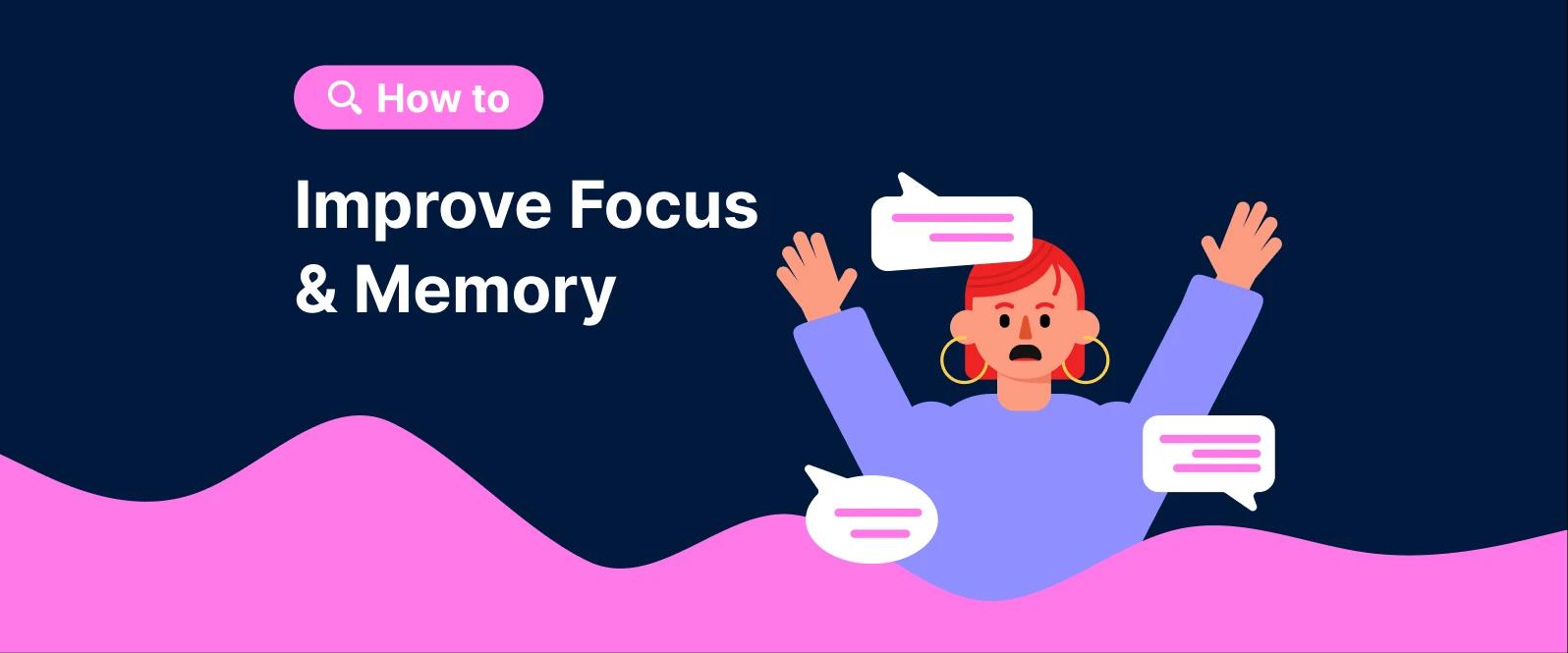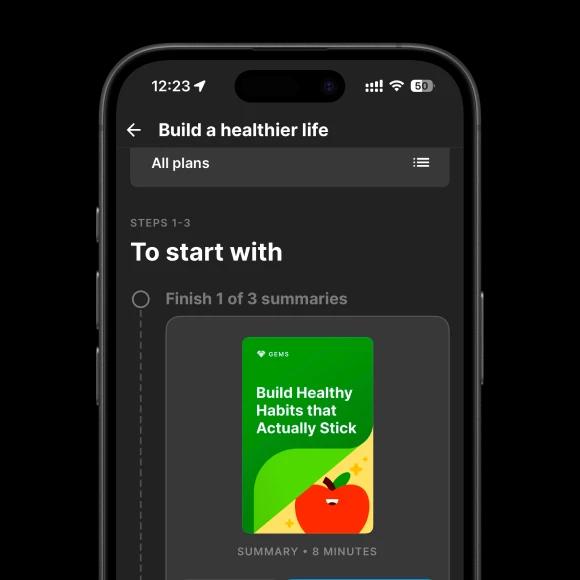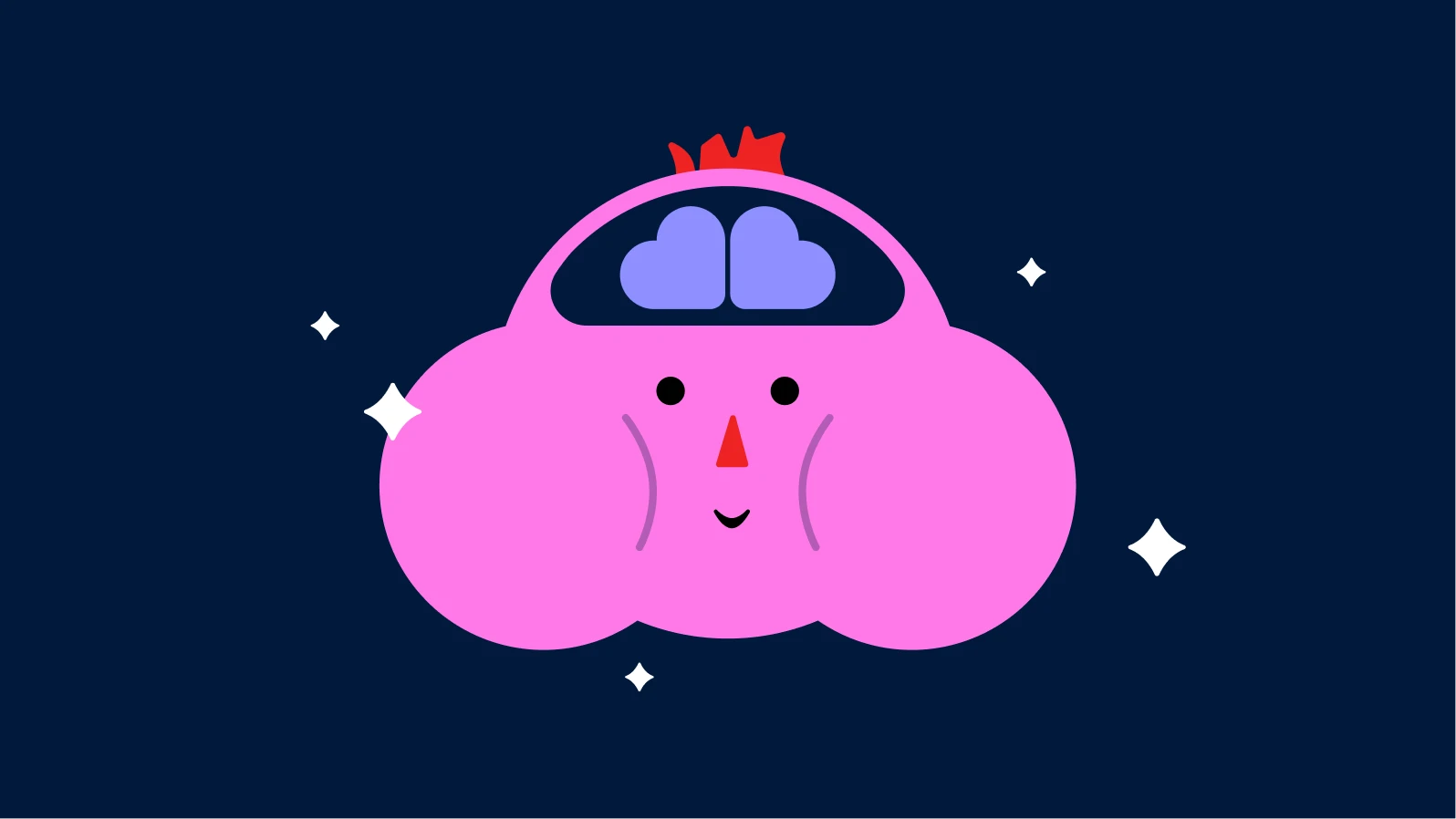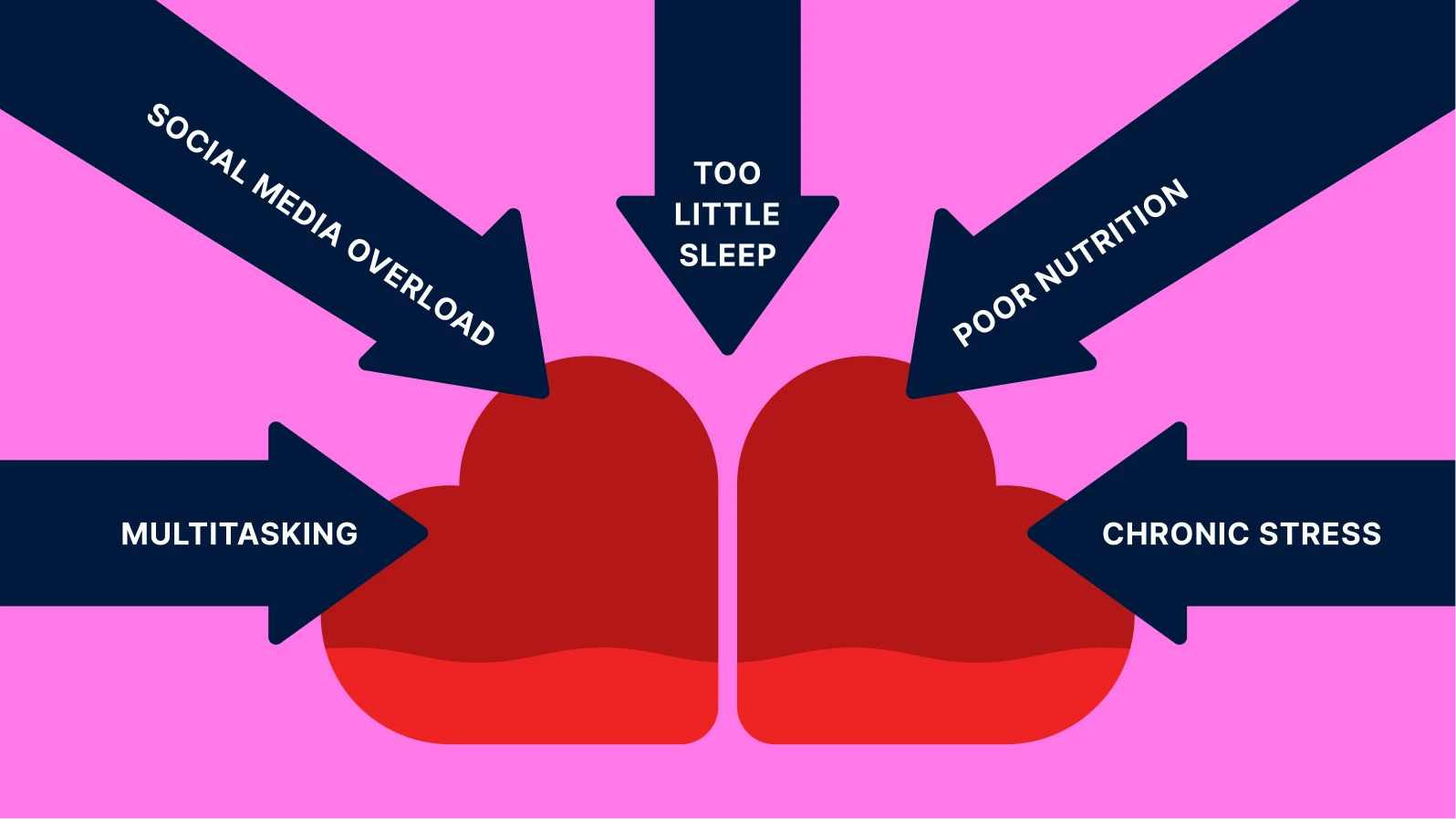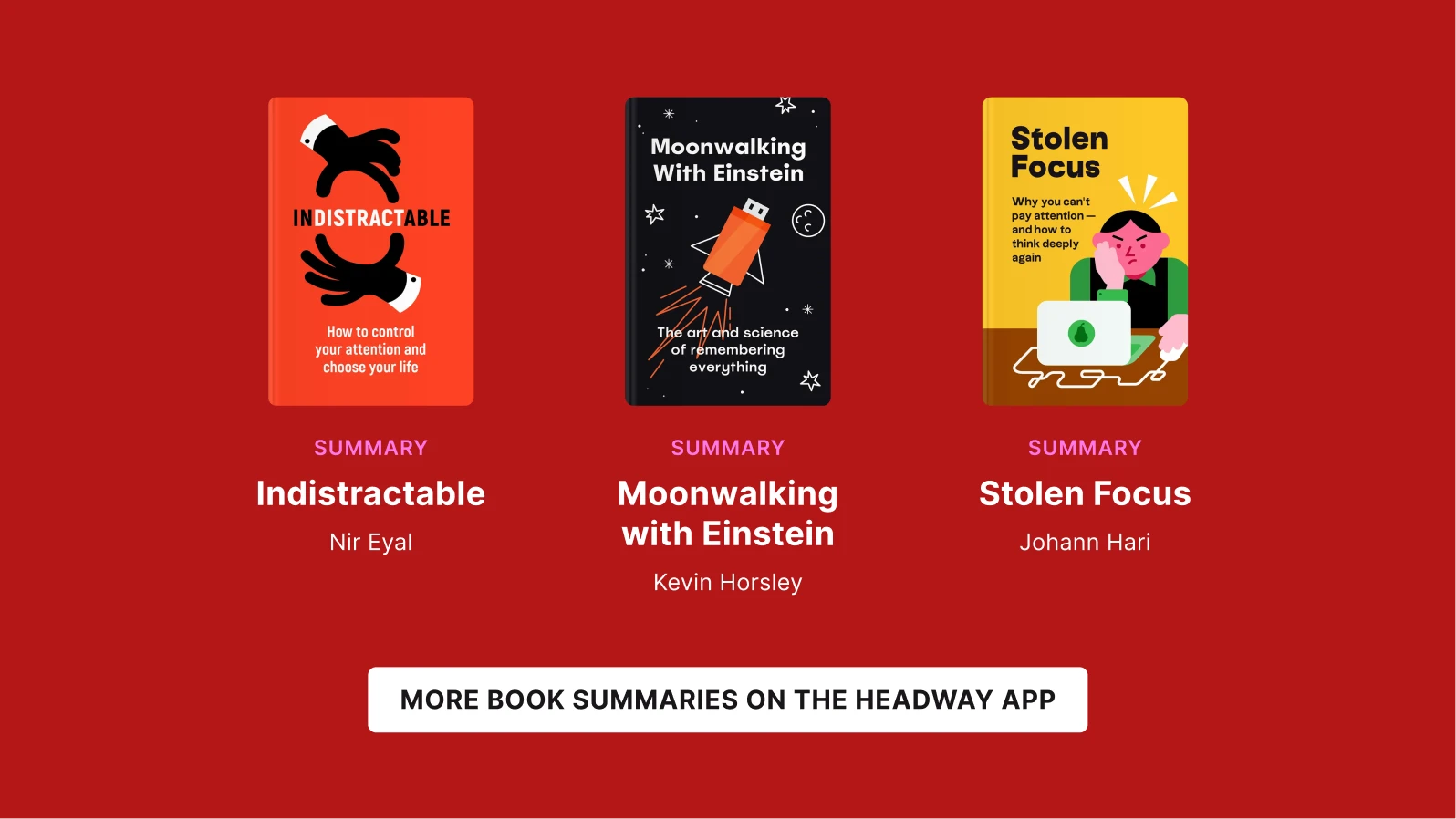Ever walk into a room and forget why you're there, or read the same paragraph three times without absorbing anything?
Focus and memory show up in everything: learning, problem-solving skills, making decisions, and connecting with people. Attention spans keep getting shorter, and memory lapses happen more. If you want to know how to improve focus and memory, understand that your brain changes based on what you do with it.
I'm Daniela, a trauma educator and somatic practitioner working with nervous system healing. My background is in sociology and trauma-informed mindfulness. I help people strengthen focus, memory, and resilience using methods that research supports.
Seeking more knowledge on focus and memory? Headway has book summaries on neuroscience, memory techniques, and cognitive health in text and audio format. You're getting information on brain training and problem-solving skills without full books.
📘 Download Headway and learn what actually strengthens focus and memory!
Quick answer: How to improve focus and memory
You don't need to change everything at once. Small habits done regularly work better — move your body, stop multitasking, take breaks, eat properly, sleep enough, and practice focus. Stick with these, and your attention span and memory improve. Here are 6 habits:
Move your body regularly
Stop multitasking
Take frequent brain breaks
Eat to fuel your mind
Get enough sleep
Practice mindful focus
Why this matters now
Your brain is juggling more information than it was built to manage. That constant barrage of input can reduce your cognitive function and mental health.
When your brain becomes overwhelmed, your short-term memory deteriorates, your attention span contracts, and you frequently lose track of what you're doing. These effects can feel worse if you're managing ADHD, dealing with medical conditions, or experiencing age-related cognitive decline.
And it's not just about productivity. When your focus falters, your sense of well-being suffers as well. You might feel scattered, disconnected, or anxious — even if you can't pinpoint why.
Fortunately, there are practical ways to reduce mental overload and rebuild clarity. There's no magic button; just start small, stay consistent, and you can make great improvements to your focus and memory.
Seven habits to help you improve your memory and focus in 2026
Research shows these daily habits can enhance cognitive performance and mental clarity. Let's dive right into them.
1. Move your body to boost your brain
Exercise is meant to improve more than your physique — it enhances brain function, too.
Aerobic activity increases blood flow and oxygen delivery to the brain, boosting concentration, improving cognitive abilities, and supporting the growth of new neurons. It also regulates blood pressure and reduces inflammation, both of which are important for long-term brain health.
Neuroscience research shows that regular movement improves memory and may reduce the risk of age-related impairment, including Alzheimer's disease.
But here's the catch — not all movement is created equal. The more novel and engaging the activity, the more your brain wakes up.
For deeper insights on how to minimize mental fatigue and stay energized throughout your day, check out the Headway summary of 'Make Time' by Jake Knapp and John Zeratsky, which offers practical strategies to stay focused and incorporate mindful movement into busy schedules.
So don't just move out of habit — move with intention. Take a different route on your walk. Turn on the music and let your body follow. Stretch between tasks while tuning into how you feel.
Real-world tip: A 15-minute walk outdoors, especially in nature or a green area, has been shown to reset attention and improve memory retention.
Joyful, embodied movement doesn't just support your physical health. It fuels curiosity, presence, and the mental stamina needed to focus.
As Johann Hari reminds us in 'Stolen Focus':
"We've created a world where it's hard to focus and even harder to find time to restore ourselves."
Movement, especially the kind that reconnects you with yourself, is one of the simplest ways to start restoring.
📘 Headway gives you summaries on cognitive health and mental clarity in 15 minutes. Download it now.
2. Stop multitasking — protect your attention
Multitasking feels efficient, but it divides your focus and drains your brain.
Every time you switch between tasks, your brain burns energy reorienting. Over time, that weakens short-term memory, slows reaction time, and leads to more mistakes.
Neuroscience confirms that the brain can't truly multitask — it shifts rapidly, reducing efficiency and accuracy. Sustained attention, in contrast, improves neural efficiency.
Try this instead:
Make a short daily to-do list.
Use 25-minute focus blocks with 5-minute breaks (Pomodoro method).
Silence notifications for part of your day.
Daily life: Turn off all app alerts and work for just 25 minutes with your full attention. You'll likely complete more tasks than in an hour of distracted work.
Nir Eyal writes in 'Indistractable,'
"Being indestructible means striving to do what you say you will do."
Focusing on one thing at a time builds memory and momentum.
3. Your brain needs breaks
We often think more output equals more productivity, but the brain isn't wired to work nonstop. Your prefrontal cortex, responsible for focus and decision-making, tires out over prolonged effort. Without recovery time, attention wavers, mistakes increase, and memory suffers.
That's where micro-breaks come in. Even five minutes of fresh air, stretching, or closing your eyes can reset your nervous system and boost clarity. These pauses aren't indulgent — they're strategic.
As Nir Eyal explains in 'Indistractable,'
"Being indestructible isn't about never being distracted. It's about being able to get back on track."
Think of your brain like a sprinter, not a marathoner — it performs best in intervals.
One Headway reader shared that setting a timer for a "tea and breath" break every 90 minutes helped her feel less overwhelmed and end her workday with more energy. It's a small habit, but it created more focus, not less.
Breaks don't slow you down. They sharpen your attention for what matters next.
4. Eat to fuel your mind
Your brain uses a lot of energy. It needs the right fuel to think clearly.
A healthy diet supports cognitive health, boosts mood, and helps prevent mental decline. The right dietary choices can also protect against inflammation and stabilize blood sugar, both of which are linked to better memory and focus.
Eat more of these:
Leafy greens: Spinach and kale are high in folate and vitamin K.
Blueberries: Antioxidants that support communication between neurons.
Whole grains: Provide lasting energy and stable blood sugar.
Omega-3 fatty acids: From walnuts, flaxseeds, and fish are essential for brain structure.
A real-world tweak: Replace sugary cereal with oatmeal, walnuts, and blueberries for a robust brain breakfast.
Supplements like magnesium and B12 may also help, especially if recommended by a healthcare provider.
📘 Get Headway and learn what supports focus and memory from people who study the brain.
5. Get enough sleep — seriously
Sleep isn't a luxury — it's the biological foundation for attention, emotional regulation, and memory formation.
Adults need 7–9 hours of sleep to function at their best. Without it, your ability to focus, form memories, and regulate emotions drops sharply. Over time, sleep deprivation increases the risk of cognitive decline, brain fog, and even long-term neurological issues.
Johann Hari puts it plainly in 'Stolen Focus':
"If you want to be able to focus, you need to sleep. It's not optional. It's the foundation."
Without enough rest, no habit or productivity hack will stick — because your brain simply can't process or retain information efficiently.
Sleep also affects blood pressure, mood stability, and immune function, impacting a person's ability to think clearly and handle daily challenges.
To support better sleep hygiene:
Keep a consistent bedtime and wake time.
Avoid screens at least 30 minutes before bed.
Make your room calm, dark, and quiet.
Neuroscience research shows that deep sleep plays a key role in memory consolidation, moving short-term information into long-term storage.
In other words, a full night's rest isn't time lost — it's where your focus begins.
6. Train your brain every day
Just like your body, your brain needs regular workouts to stay strong.
Daily mental stimulation supports memory, improves cognitive function, and delays age-related impairment. Brain exercises also activate neuroplasticity — your brain's ability to adapt.
Try:
Solving crossword puzzles, Sudoku, or brain games.
Memorizing poems, names, or short lists.
Practicing mnemonics like acronyms, rhymes, or visual memory hooks.
For example, associate someone named Lily with a visual of a flower in their hair. It makes recall much easier.
Joshua Foer writes in 'Moonwalking with Einstein':
"What makes things memorable is that they are meaningful, significant, colourful."
The more vivid your connection, the stronger your memory.
7. Practice mindful focus
Mindfulness is the daily practice of noticing your thoughts and returning to what matters.
It trains your attention, supports emotional balance, and activates regions of the brain tied to memory and learning. Studies show mindfulness can help boost concentration and reduce symptoms of anxiety and ADHD.
Mindfulness isn't about emptying your mind — it's about gently choosing what to pay attention to. As Johann Hari puts it,
"You can only be conscious of one or two things at a time. That's the nature of attention."
Here are three simple ways to start:
Take three slow breaths before opening your laptop.
Eat one meal a day without screens or distractions.
Stroll and focus on the sounds around you.
Sensory anchor: Feel your feet on the ground as you breathe. Grounding the body grounds the mind.
Even a 60-second pause before starting your workday can shift your mindset. One reader, a university student managing ADHD, began using a grounding ritual before studying: a breath, a sip of water, and a sentence like "I'm here now." Within two weeks, she reported less screen-scrolling, more presence, and, surprisingly, fewer headaches.
If staying focused feels hard, you're not broken — you're untrained. For more practical techniques to declutter your mind and improve recall, explore the Headway summary of 'Create Space' by Derek Draper. It shares strategies to sharpen focus and strengthen decision-making by creating mental clarity.
These small moments help rebuild the mental muscle of focus — one breath, one choice, one return to the present at a time.
📘 Try Headway and access expert advice on improving memory and mental health.
Five habits that hurt your memory and focus
Before getting into the solutions, let's name a few patterns that quietly rob your focus and memory:
Multitasking: Constant switching between tasks weakens memory and disrupts concentration.
Too little sleep: Less than 7 hours impairs short- and long-term memory.
Poor nutrition or skipped meals: The brain requires steady, quality fuel to function well.
Chronic stress: Persistent stress keeps your nervous system in survival mode, blocking memory formation.
Social media overload: Excessive scrolling trains your brain to expect constant stimulation and shortens your attention span.
The good news is that adjusting just one of these habits can reduce mental fatigue and improve recall.
How stress rewires your brain
Chronic stress doesn't just wear you down; it changes your brain. Stress floods your system with cortisol. Over time, this shrinks the hippocampus (your memory center) and weakens the prefrontal cortex, which manages decision-making and impulse control.
This rewiring leads to:
Memory issues and brain fog
Poor concentration and emotional reactivity
Difficulty learning new things
That's why managing stress is a core part of improving focus.
Here are a few daily strategies to reduce stress:
Journal in a free-writing style before bed.
Stretch and take deep breaths before starting your day.
Replace doom-scrolling with a short walk or some quiet time.
Even one of these rituals helps bring your nervous system back into balance.
Quick reflection
Take a moment to check in:
Are you getting enough hours of sleep to function clearly?
What small daily habits could help reduce stress or screen time?
What's one thing you could do today to support your mental health?
You don't have to do it all overnight. One change, when practiced consistently, can make a real difference. Here are some places to start:
Take a 10-minute walk without your phone.
Go to bed 30 minutes earlier tonight.
Try to memorize a short poem or affirmation.
Make a brain-friendly breakfast tomorrow.
Silence notifications for your next task.
📘 Remember, small shifts make real impacts. Headway gives you neuroscience insights in 15 minutes. Download it and strengthen your focus.
Five books that can help with focus and memory
These five books — all available on the Headway app — explore focus, memory, and mental clarity from different angles:
'Digital Minimalism' by Cal Newport: Offers practical strategies to reduce digital distractions, reclaim your attention, and create space for deeper focus and meaningful activities.
'Create Space' by Derek Draper: Combines psychology and practical advice to help you declutter your mind, improve focus, and make better decisions in a busy world.
'Indistractable' by Nir Eyal: Teaches how to overcome internal and external distractions to live with intention.
'Stolen Focus' by Johann Hari: Explores systemic reasons for attention loss — and how to reclaim your ability to focus.
'Make Time' by Jake Knapp, John Zeratsky: Blends mindfulness and mental health support with easy rituals to restore clarity.
Each summary takes 15 minutes, but doing so can reshape your thinking, work, and focus.
Boost your focus and memory with Headway!
Learning how to improve focus and memory requires a healthy lifestyle: regular exercise, proper sleep, good nutrition, and mindful attention. Whether you're dealing with ADHD, stress, or age-related decline, these habits support your mental health and cognition. Improving memory needs repetition.
Headway has 15-minute book summaries on memory techniques, focus strategies, and brain health from neuroscience experts. You get specific methods, save hours of time, and invest in your self-growth.
📘 Download Headway and learn what works for your brain!
FAQs about how to improve focus and memory
How to improve the presence of mind?
Improving the presence of mind starts with daily mindfulness practices like breathwork, single-tasking, and grounding techniques. Activities such as meditation, mindful walking, or simply pausing to notice your surroundings can strengthen your attention and help you stay focused in the present moment. Reducing distractions and practicing intentional focus also enhances mental clarity over time.
How to train your brain to learn again?
You can train your brain to learn again by engaging in consistent mental exercises, such as solving puzzles, learning new skills, or reading book summaries that challenge your thinking. Regularly exposing your mind to new information stimulates neuroplasticity, the brain’s ability to adapt and grow, even in adulthood. Start with small, manageable learning goals to rebuild confidence and cognitive stamina.
How to train your brain to think faster?
Training your brain to think faster involves practicing activities that require quick decision-making, like mental math, memory games, or timed puzzles. Reducing multitasking and improving your focus through mindfulness and single-tasking also sharpens cognitive speed. Getting enough sleep, exercising regularly, and maintaining a healthy diet further support faster, clearer thinking.
Can a slow person be intelligent?
Yes, absolutely. Processing speed and intelligence are not the same. Many highly intelligent people take more time to process information deeply, which can appear as slowness. Intelligence involves problem-solving, creativity, memory, and understanding complex ideas — none of which depend solely on how quickly you think.
Do I have brain fog?
Common signs of brain fog include difficulty concentrating, forgetfulness, mental fatigue, and slower thinking. If you often feel mentally sluggish, struggle to focus, or experience short-term memory lapses, you might be dealing with brain fog. Addressing underlying causes like poor sleep, stress, poor nutrition, or excessive screen time can help clear mental haze.

